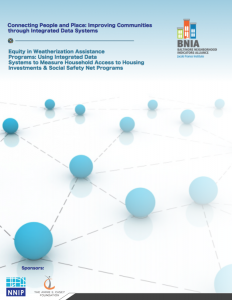 The Baltimore Neighborhood Indicators Alliance-Jacob France Institute (BNIA-JFI) at the University of Baltimore seeks to better understand the equity of access to programs that help households receive energy assistance to make weatherization improvements to reduce energy consumption. BNIA-JFI will study applicants and recipients of funds provided by the Maryland Department of Housing and Community Development‘s Weatherization Assistance Program (WAP). Studies have shown that households in homes that have been weatherized experience greater residential stability and increased financial security. Analysis will focus on how access to WAP impacts the use of other social safety net programs, affects overall household employment stability, and how WAP-serviced homes may improve housing and neighborhood stability in areas where there is a concentration of investment.
The Baltimore Neighborhood Indicators Alliance-Jacob France Institute (BNIA-JFI) at the University of Baltimore seeks to better understand the equity of access to programs that help households receive energy assistance to make weatherization improvements to reduce energy consumption. BNIA-JFI will study applicants and recipients of funds provided by the Maryland Department of Housing and Community Development‘s Weatherization Assistance Program (WAP). Studies have shown that households in homes that have been weatherized experience greater residential stability and increased financial security. Analysis will focus on how access to WAP impacts the use of other social safety net programs, affects overall household employment stability, and how WAP-serviced homes may improve housing and neighborhood stability in areas where there is a concentration of investment.
Address-level property records from BNIA-JFI, including data on foreclosure filings, code violations, home sales, and rehabilitation permits, will be linked to a database of WAP applicants and recipients from the Maryland Department of Housing and Community Development. In addition to BNIA-JFI’s property records, the Jacob France Institute’s (JFI) IDS on wage records and social assistance will also be linked to the database of WAP applicants and recipients. JFI maintains individual-level, longitudinal data from the Maryland Departments of Labor, Licensing and Regulations, Human Resources, and Education. Included in the JFI IDS are Unemployment Insurance Wage Record files and temporary cash assistance and SNAP administrative records.
The focus on equity of access for this project lies in growing number of studies that show reducing disparities at the regional level requires the consideration of both people and place. From the results of the analysis, three main findings stand out:
1. WAP services tend to be applied in “middle” neighborhoods with low levels vacant housing and moderate median sales prices, but slightly higher than average unemployment levels.
2. WAP applicants living in predominantly owner-occupied housing who were denied WAP tend more often to experience foreclosure filings which is a sign of household distress.
3. WAP services and TANF, a key social safety net program, co-occur less than expected.
View and Download the report here.
NNIP has launched a three-year cross-site project supported by the Annie E. Casey Foundation to expand the relevance of integrated data systems (IDS) for local policy. An integrated data system is one that collects ongoing individual-level data from multiple administrative agencies whether at the city, county or state level. The project will connect local NNIP partners, who all work to advance data-driven decisionmaking in their neighborhoods, with organizations and agencies running IDS.
The Urban Institute coordinates the project and takes the lead on cross-site dissemination and reports. The six participating NNIP partners have each designed a site-specific project that responds to a local policy concern and incorporates both data from an IDS and from their own neighborhood data holdings.
NNIP Partners will first take part in a planning phase where they will establish relationships with the relevant IDS agency and community stakeholders, negotiate data sharing agreements, and finalize their plan for analysis and dissemination. During the second phase in 2014-15, partners will gather and analyze the data, report their results, and present their findings at a community forum.
See more information about the project here